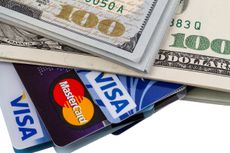How Do Credit Cards Work? APR, Interest and Fees Explained
Credit cards can be a valuable addition to your wallet, as long as you know how to use them.
- (opens in new tab)
- (opens in new tab)
- (opens in new tab)
- Newsletter sign up Newsletter

Just how do credit cards work? A credit card lets you access a revolving line of credit, making purchases that can be paid off later. As with other loans, credit cards have interest rates that can add up if balances aren’t paid off each month. Using one of the best credit cards can act like a power tool; in capable hands, a card may offer flexibility and lucrative benefits, but when poorly managed, it can severely damage your finances.
There are many types of credit cards, so be sure to choose a credit card that best fits your situation.
How do credit cards work?
A credit card is a tool to help you make purchases up to a certain amount, known as a "credit limit." Typically, credit card companies determine your credit limit by taking into account your credit history, credit score and financial situation. A high credit score signals that you tend to be responsible with your finances, paying your bills on time and using debt wisely.

Sign up for Kiplinger’s Free E-Newsletters
Profit and prosper with the best of expert advice on investing, taxes, retirement, personal finance and more - straight to your e-mail.
Profit and prosper with the best of expert advice - straight to your e-mail.
Many credit card customers never make enough purchases to reach their credit limit (called "maxing out" your credit card.) In fact, one way to protect or increase your credit score is to charge no more than about 30% of the total amount available to you on each card. But if you do reach your credit limit on a credit card, you’ll have to pay off part of your balance before making any additional purchases on the card. If you demonstrate consistent on-time payments, your credit limit can increase over time.
When you make a purchase with a debit card, you’re using your own money, but when shopping with a credit card, the money is drawn from the credit card company. So, if you don’t pay off balances each month, you’ll have to pay interest on your balance, depending on your card’s APR.
APR
If you "carry a balance" on a credit card from month to month, meaning you don't pay your bill in full, you will be charged interest. Credit card APRs (annual percentage rates) vary from card to card, typically expressed as a percentage range. So if you don’t want to incur any additional interest expenses, you will need to pay off your balance in full each month. You will likely get a better APR if you have a high credit score. Currently, the average credit card APR for new offers is 21.44% for new offers and 16.27% for existing accounts (opens in new tab).
What is a credit score?
To be approved for most credit cards, you’ll need to know and understand your credit score, often expressed as a number between 300 and 850. A higher score shows lenders that you are more likely to repay debt and manage your credit wisely. For example, to be approved for the Discover it Cashback (opens in new tab) card, you’ll need a credit score between 670 and 850. And the higher your score, the more likely you will be to secure an APR at the lower end of the card’s range.
Credit Card Payments
Every month you will receive a credit card statement showing the total amount you owe and the minimum payment due. While you will not be required to pay off your total bill every time, you will have to make at least the minimum payment by a specific date.
Minimum payments usually range from 1% to 3% of your total balance. But beware; cardholders can quickly get into an overwhelming cycle of credit card debt by only paying the minimum amount due. In fact, credit card issuers are required to disclose how long it would take you to pay off your balance if you only paid the minimum amount due, usually stretching into years of payments. So you should ideally pay the total amount due each month. And since late payments can drastically decrease your credit score, it’s also important to have a consistent history of on-time payments to maintain good credit.
Credit Card Fees
Credit cards also carry additional fees that vary from card to card.
Balance transfer fee: You may pay a balance transfer fee when transferring debt from one credit card to another, usually to get a better interest rate. These fees typically range from 3% to 5%.
Foreign transaction fee: A foreign transaction fee is charged when you make purchases with your credit card outside of the U.S. These fees can range anywhere from 1% to 5%, though many cards do not charge this fee.
Annual fee: An annual fee is what you’ll pay each year to keep your credit card account, and the amount varies between cards. Some cards waive the annual fee in the first year, and many cards charge no annual fee.
Late payment fee: Many cards will charge a late payment fee if you don't make a payment by the deadline on your credit card bill.
Types of credit cards
Balance transfer cards: If you’re carrying debt on your current credit card and are looking to pay it off with a lower interest rate, you can transfer that debt to a balance transfer card. Many have 0% introductory APR periods that will help you cut down on debt without being stuck with hefty interest payments. Kiplinger can help you find the best balance transfer card for your needs.
Secured cards: Secured cards are great options for those with little to no credit history or a bad credit score. With a secured card, your credit limit is determined by the size of the cash deposit you make upfront. We've picked some of the best secured cards in our round-up of the best credit cards for bad credit.
Travel cards: Many credit cards are specifically designed for travelers, offering no foreign transaction fees and helping users rack up airline miles on purchases. If you are interested in learning more about these options, read our article on the best travel rewards credit cards.
Rewards credit cards: Many credit cards offer cash back or reward points on purchases. Some cards have a flat-rate cash back rewards rate, while others offer higher points on purchases made in specific spending categories. If you are interested in rewards cards, we have picked the best cash back credit cards, as well as the best rewards credit cards overall.
Bottom line
Credit cards can be a valuable addition to your wallet, just as long as you know how to use them. They can be a great tool to shop with, as many let you earn cash back or travel rewards and come additional benefits like purchase protections. Just make sure you’re only spending what you’re reasonably able to afford, or you’ll be stuck with expensive interest charges and run the risk of missing payments.

Erin pairs personal experience with research and is passionate about sharing personal finance advice with others. Previously, she was a freelancer focusing on the credit card side of finance, but has branched out since then to cover other aspects of personal finance. Erin is well-versed in traditional media with reporting, interviewing and research, as well as using graphic design and video and audio storytelling to share with her readers.
-
-
 Is Etsy Stock Finally a Buy?
Is Etsy Stock Finally a Buy?Etsy stock might be the bargain investors have been waiting for now that it's 70% off its all-time high.
By Dan Burrows • Published
-
 Quiet Luxury — What is It and Could It Help You Manage Your Money?
Quiet Luxury — What is It and Could It Help You Manage Your Money?Quiet luxury or stealth wealth is the internet’s newest trend. It could teach you a thing or two about managing your money.
By Tom Higgins • Published
-
 What Is a Balance Transfer Credit Card? A Guide to Balance Transfers
What Is a Balance Transfer Credit Card? A Guide to Balance TransfersA balance transfer card is a credit card that allows you to transfer balances from other accounts to it.
By Erin Bendig • Published
-
 Types of Credit Cards Explained
Types of Credit Cards ExplainedLearn more about the different types of credit cards available to you.
By Erin Bendig • Published
-
 Get the Most Benefit from Credit Card Perks
Get the Most Benefit from Credit Card PerksMake the most of credit card perks like travel insurance, delivery discounts and fraud protection.
By Rivan V. Stinson • Published
-
 Should I Use Credit or Debit?
Should I Use Credit or Debit?Basics Credit cards offer more protections and rewards, but debit cards reduce the temptation to overspend.
By Emma Patch • Published
-
 How to Avoid Paying 17 Pesky Fees
How to Avoid Paying 17 Pesky Feesspending Fees aren’t just annoying—they’re expensive.
By Lisa Gerstner • Published
-
 14 Little-Known Credit Card Perks
14 Little-Known Credit Card Perkscredit cards Rewards points and cash back aren’t the only benefits of paying with plastic.
By Lisa Gerstner • Published
-
 Credit, Debit or Cash?
Credit, Debit or Cash?credit & debt Each method has pros and cons. Your best bet is to stay flexible.
By Lisa Gerstner • Published
-
 Top Credit Cards for Fraud Protection
Top Credit Cards for Fraud Protectioncredit & debt As data breaches mount up, you may want to choose a card whose issuer provides you with tools to counter fraud and will back you up if your information is stolen.
By Lisa Gerstner • Published








